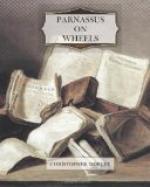I made a valiant effort to summon some of my governessly recollections of literature.
“I give it up,” I said feebly. “Is it Carlyle?”
“That is by Andrew McGill,” he said. “One of his cosmic passages which are now beginning to be reprinted in schoolbooks. The blighter writes well.”
I began to be uneasy lest I should be put through a literary catechism, so I said nothing, but roused Peg into an amble. To tell the truth I was more curious to hear the Professor talk about his own book than about Andrew’s. I had always carefully refrained from reading Andrew’s stuff, as I thought it rather dull.
“As for me,” said the Professor, “I have no facility at the grand style. I have always suffered from the feeling that it’s better to read a good book than to write a poor one; and I’ve done so much mixed reading in my time that my mind is full of echoes and voices of better men. But this book I’m worrying about now really deserves to be written, I think, for it has a message of its own.”
He gazed almost wistfully across the sunny valley. In the distance I caught a glint of the Sound. The Professor’s faded tweed cap was slanted over one ear, and his stubby little beard shone bright red in the sun. I kept a sympathetic silence. He seemed pleased to have some one to talk to about his precious book.
“The world is full of great writers about literature,” he said, “but they’re all selfish and aristocratic. Addison, Lamb, Hazlitt, Emerson, Lowell—take any one you choose—they all conceive the love of books as a rare and perfect mystery for the few—a thing of the secluded study where they can sit alone at night with a candle, and a cigar, and a glass of port on the table and a spaniel on the hearthrug. What I say is, who has ever gone out into high roads and hedges to bring literature home to the plain man? To bring it home to his business and bosom, as somebody says? The farther into the country you go, the fewer and worse books you find. I’ve spent several years joggling around with this citadel of crime, and by the bones of Ben Ezra I don’t think I ever found a really good book (except the Bible) at a farmhouse yet, unless I put it there myself. The mandarins of culture—what do they do to teach the common folk to read? It’s no good writing down lists of books for farmers and compiling five-foot shelves; you’ve got to go out and visit the people yourself—take the books to them, talk to the teachers and bully the editors of country newspapers and farm magazines and tell the children stories—and then little by little you begin to get good books circulating in the veins of the nation. It’s a great work, mind you! It’s like carrying the Holy Grail to some of these way-back farmhouses. And I wish there were a thousand Parnassuses instead of this one. I’d never give it up if it weren’t for my book: but I want to write about my ideas in the hope of stirring other folk up, too. I don’t suppose there’s a publisher in the country will take it!”




